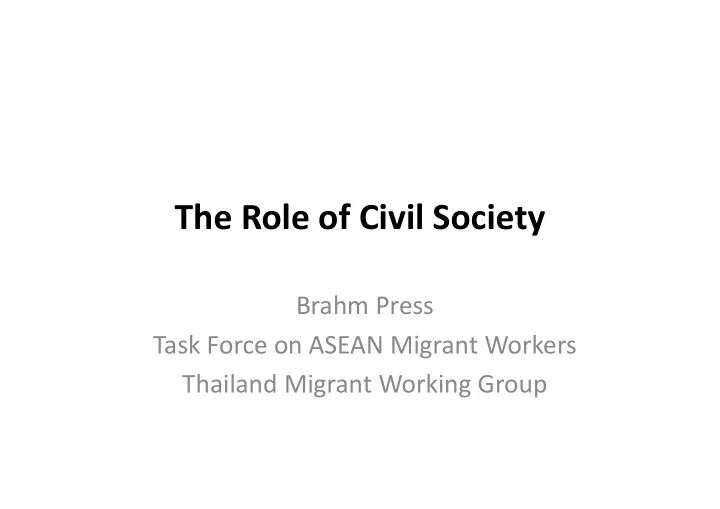

The Role of Civil Society Brahm Press Task Force on ASEAN Migrant Workers Thailand Migrant Working Group
What is Civil Society? • Non-government organizations • Community-based organizations • Mission oriented • Complimentary to governments by filling gaps in service CSO= Civil Society Organizations
Pre- Pre-departure • Community interventions are necessary in source communities to provide information on “migration realities” prior to migrants making the decision to migrate. • Pre -pre departure allows prospective migrants and their families to weigh risks and benefits, and make good decisions. • CSO interventions include: radio shows, public forums, community sessions, booths at festivals / markets
Pre-departure For those who chose to migrate for work, civil society organizations can: • Contribute to development of holistic pre- departure curriculums; • Supplement official pre-departure trainings by providing sessions on labour rights, how to access assistance, redress, and to approach sensitive issues such as HIV prevention; • Provide information and HIV counseling during health testing.
On-site • Upon arrival – CSOs can provide orientation on laws and policies, and provide contact information for assistance, including for NGOs, embassies and labour attaches; • On-site - Civil society can access migrants and overcome communication barriers; they can act as a linkage to migrants in hard-to-reach work places and communities; • Interventions include : outreach activities and peer networks, hotlines and on-line interventions, drop-in centers, printed materials and other forms of media (radio, video, social media) in migrant languages, case management and referral.
Return and reintegration • CSOs act as a linkage to the communities where migrants return, and can provide essential counseling and referral to services; • Provide follow-up and support groups for those with special needs such as: people living with HIV, survivors of violence, injury or disability, and women’s groups; • Develop advocates and spokespersons to represent migrants and their special needs to policy makers, communities and other stakeholders.
Policy making • It is rare that migrant policy is drafted with inputs from civil society or migrant groups, and that is why this occasion is a great opportunity. • Civil society may not be able to provide fully developed policies, but through their expertise and understanding of migrant workers, and the “Human Rights” perspective / framework they offer, CSOs should have a legitimate place at the table where they can provide inputs to the development of national policies and legislation that affect migrants’ rights and well being.
Recommend
More recommend